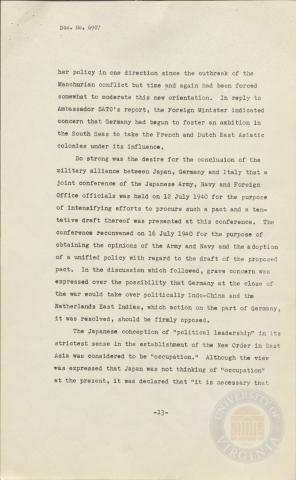
Page 13
| Parent | Doc. 6907 - Collaboration Between Japan, Germany and Italy, Volume 1 - Opening Statement |
|---|---|
| Date | |
| Language | English |
| Collection | Tavenner Papers & IMTFE Official Records |
| Box | Box 15 |
| Folder | Japan, Germany, Italy Collaboration Vol 1 |
| Repository | University of Virginia Law Library |
Doc. No. 6907
her policy in one direction since the outbreak of the Manchurian conflict but time and again had been forced somewhat to moderate this new orientation. In reply to Ambassador SATO's report, the Foreign Minister indicated concern that Germany had begun to foster an ambition in the South Seas to take the French and Dutch East Asiatic colonies under its influence.
So strong was the desire for the conclusion of the military alliance between Japan, Germany and Italy that a joint conference of the Japanese Army, Navy and Foreign Office officials was held on 12 July 1940 for the purpose of intensifying efforts to procure such a pact and a ten-tative draft thereof was presented at this conference. The conference reconvened on 16 July 1940 for the purpose of obtaining the opinions of the Army and Navy and the adoption of a unified policy with regard to the draft of the proposed pact. In the discussion which followed, grave concern was expressed over the possibility that Germany at the close of the war would take over politically Indo-China and the Netherlands East Indies, which action on the part of Germany, it was resolved, should be firmly opposed.
The Japanese conception of "political leadership" in its strictest sense in the establishment of the New Order in East Asia was considered to be "occupation." Although the view was expressed that Japan was not thinking of "occupation" at the present, it was declared that "it is necessary that
